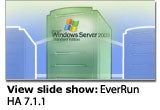Complexity and costs have long been the stumbling blocks preventing smaller businesses from deploying high availability or fail-over solutions. After all, building those solutions is still a challenge for even the most tech-savvy solution providers, especially when constrained by budgets and schedules.
Some think the answer to this dilemma lies with clustering technology, but many are finding that the needed investments in hardware, software and knowledge place clusters out of reach for most small enterprises. Does this mean that VARs should avoid implementing high availability for those smaller enterprises? In a word “no,” thanks to Marathon Technologies!
Marathon is offering a different approach to the high availability market: a software-only approach that leverages virtualization concepts and eliminates the need for specialized hardware. The company offers several products aimed at the high availability market, but solution providers will want to take note of Marathon everRun HA, a software application that takes redundancy to a higher level.
What makes everRUN HA so different from other solutions is how the product is deployed. The product delivers extremely high levels of application availability while protecting applications, data, networks and operating systems from faults, failure and dropped network connections by synchronizing two standard Windows servers to create a virtual application environment.
In other words, two Windows servers are mirrored into a virtual environment, every process, transaction or event is duplicated in real time on both systems. If one system or application fails, then a technology called “ComputeThru” masks the failure from the virtual environment. Everything continues to work, and the administrator is informed of a failure.
Designed to run on standard Windows servers, everRun HA eliminates the need for special “cluster-aware” applications, tedious scripting, specialized hardware or complex coding. Any out-of-the-box Windows application can be installed and managed in the virtual environment just as if it were a single physical stand-alone server. Solution providers will find that one of the key selling points for everRun HA is the fact that it works with regular Windows applications.
Installation of everRun HA is straightforward, excellent documentation speeds the installation chores, and well illustrated tips and tricks help installers avoid hassles.
EverRun HA requires two servers for use as CoServers, each with two physical processors, two cores or Intel’s Hyper-Threading functionality. The product needs at least two processors per CoServer because it dedicates one processor to running the virtual server and the other to running the CoServer itself.
Each server must have at least 768MB of RAM, a Gigabit Ethernet adapter for keeping servers in sync and another Ethernet adapter for a network connection. Interestingly, the servers need not be identical. That allows companies to base their secondary CoServer on lower cost hardware then the primary server.
Initial testing of the product allowed us to simply yank the plug on the primary server and have everything on the network continue to function. No data was lost, and there was no interruption of services. A browser-based management console keeps tabs on the current status of the “virtual pair” and allows administrators to perform operations associated with the CoServer environment.
Bringing a failed server back up proves to be quite simple. Once the failed unit comes back on line, an administrator can simply instruct the server to rejoin the environment, which will execute a synchronization process which quickly recreates the mirrored environment.
The product enables VARs to do much more than just fail over or high availability; the way everRun HA works allows single servers to be taken off line for upgrades or patching and then tested before being rejoined to the network. That capability can prove to be a major time saver when prototyping network changes. To further support that capability, the product offers uninstall capabilities that allow administrators to roll back changes or use dynamic updates. Dynamic updates allow administrators totemporarily” install patches, upgrades or applications for testing and then choose whether or not to discard those changes.
EverRun HA costs $7,500 per system for single-socket servers, $10,000 per server for dual-socket machines and $12,500 for servers with more than two sockets—that’s in addition, of course, to the costs for the CoServer hardware and for the two Windows Server 2003 licenses.
The company operates the Marathon Infinity Partner Program to interested resellers. All sales are fulfilled via registered partners. There are two levels to the partner program, Preferred and Elite. Partners are required to meet annual revenue targets, attend product training seminars, participate in sales training and offer first-level support to their customers.


